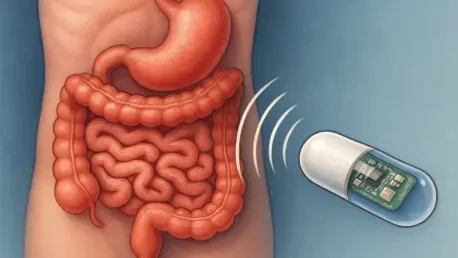In a transformative leap for healthcare technology, researchers have integrated synthetic biology, electronics, and mobile technology into ingestible capsules that can communicate with engineered bacteria in the human gut. This groundbreaking development offers promising potential for diagnosing and treating inflammatory diseases through precise and personalized medical interventions. By combining engineered microbes, optoelectronic devices, and smartphone capabilities, these capsules can monitor microbial activity and execute targeted therapeutic responses, allowing healthcare experts to manage complex conditions more effectively.
Integrating Biology and Technology
The Role of Engineered Microbes
At the heart of this innovative system is the use of engineered microbes, specifically the probiotic bacterium Escherichia coli Nissle 1917. Known for its ability to colonize the human gut safely, E. coli Nissle 1917 has been genetically engineered to detect inflammatory signals, such as the presence of nitric oxide (NO), which are indicative of gut diseases like colitis. Upon detection, these modified bacteria emit bioluminescent light, acting as biological sensors that provide valuable data on the gut’s inflammatory state. The ability to transform chemical signals into bioluminescence not only aids in diagnosing inflammatory diseases but also highlights the versatility of engineered microbes for in vivo sensing.
Designing Bidirectional Communication
The real potential of these ingestible capsules lies in their ability to establish bidirectional communication with the human body. To achieve this, researchers developed optoelectronic capsules equipped with photodetectors capable of detecting the bioluminescent signals emitted by the engineered microbes. These signals are then converted into electrical data that can be wirelessly transmitted to a smartphone, allowing continuous and noninvasive monitoring of gut health. Additionally, the capsules can receive signals from a smartphone to initiate therapeutic actions, such as triggering miniaturized LEDs to emit light that activates the optogenetically engineered bacteria to express therapeutic proteins. This bidirectional capability provides a closed-loop system that dynamically responds to real-time changes in the gut environment.
Technical and Biomedical Implications
Deployment and Challenges
Engineering the ingestible capsules involved overcoming significant challenges associated with miniaturization, integration, and resilience in the gastrointestinal tract. The capsules are designed to endure harsh conditions such as gastric acidity and enzymatic activity while maintaining their functionality. They are manufactured from biocompatible materials to ensure safety over extended periods within the body. Additionally, power management strategies have been optimized to accommodate the energy requirements of continuous operation without compromising the capsule’s size or efficiency. These technological advancements underscore the dedication to creating devices that align with clinical needs while addressing practical issues related to ingestion and biological compatibility.
Potential Applications and Impacts
While the initial focus is on inflammatory diseases like colitis, this technology’s versatility opens avenues for addressing a range of gastrointestinal disorders. Conditions characterized by distinct biomarker signatures, such as inflammatory bowel disease (IBD) and irritable bowel syndrome (IBS), stand to benefit from the platform’s ability to monitor physiological changes noninvasively. By integrating synthetic biology with digital signals, the capsules allow for real-time remote health monitoring, supporting telemedicine and enabling tailored treatment plans without frequent hospital visits. The socioeconomic impact is substantial, especially for chronic conditions that necessitate constant surveillance. The advent of personalized medicine through dynamic interventions could redefine chronic disease management, reducing healthcare costs and improving patient outcomes.
Ethical and Future Considerations
Safety and Ethical Concerns
As revolutionary as this technology is, it does not come without ethical considerations. Embedding genetically modified organisms and electronic devices inside human bodies prompts concerns regarding safety and environmental impact. Comprehensive biosafety evaluations are necessary to ensure containment and mitigate risks such as horizontal gene transfer. The modular nature of this system allows for adaptive therapeutic approaches through the potential replacement of therapeutic payloads or microbial strains. This adaptability is key to maintaining ethical standards while meeting regulatory requirements for safe implementation.
Future Directions and Innovations
Looking forward, scaling these ingestible systems for human applications requires continued refinement in device miniaturization and power autonomy. Enhancing the sensitivity of detection circuits will be pivotal for accurately reflecting complex biological states. Additionally, expanding the therapeutic repertoire of engineered microbes paves the way for novel treatments beyond gastrointestinal ailments, potentially addressing metabolic disorders, certain cancers, and infectious diseases. This vision encompasses a synergy between biology and electronics that fosters living electronic systems capable of communicating with the biological world to deliver precise and proactive medical care.
Transformative Potential in Healthcare
In a significant advancement for healthcare technology, scientists have fused synthetic biology, electronics, and mobile technology to create ingestible capsules that can communicate with specially designed bacteria in the human digestive system. This revolutionary innovation holds great promise for diagnosing and treating inflammatory diseases with greater accuracy and customization. By melding engineered microbes with optoelectronic devices and utilizing smartphone technology, these capsules have the ability to not only monitor the activity of microbes but also implement precise therapeutic responses based on the data collected. This allows healthcare professionals to manage complex health conditions more effectively and efficiently. The capsules can be seen as a new frontier in personalized medicine, providing a level of treatment that aligns more closely with each patient’s specific needs. Such development could transform standard medical practices by making them more patient-centric and technologically sophisticated, ultimately leading to better health outcomes. The integration of these advanced technologies represents a shift toward leveraging cutting-edge science to address challenging health issues, thereby opening up new possibilities in the realm of modern medicine. These capsules embody the potential to reshape how we diagnose and treat diseases, pointing toward a future where medical interventions are guided by a deeper understanding of individual biology.









